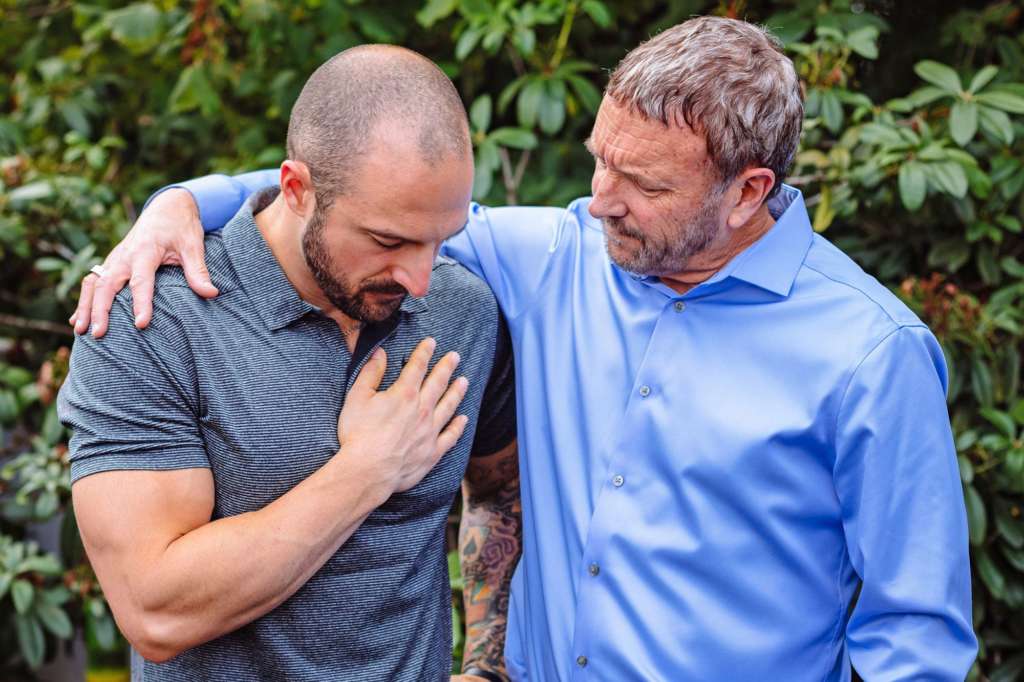
Should addiction be treated as a spectrum disorder like autism?
We were interested to read a feature in the New York Post that sparked our attention. Molly Shea wrote, “Should addiction be treated as a spectrum disorder like autism?”
Molly goes on to say…

Paul Thomas with his son Noah (left), who also struggled with addiction. By Jason QuigleyIn spring 2000, paediatrician Paul Thomas was cleaning out his Portland, Ore., shed when he made a horrifying discovery. It was a vision board he’d made in 1989 when he was 32. At the top of the board, which mapped out his plans for the year ahead, were the words “stop drinking.”
“I froze, because I realized that after 11 years that was still my primary goal,” Thomas, now 61, tells The Post. “Most mornings that past decade, I’d wake up hungover and think, ‘Damn it, I did it again.’”
Looking back on those years, Thomas describes himself as “a functional alcoholic.” Each day after work, he’d swing by the liquor store, fill a Diet Coke can with vodka, make dinner for his wife and nine children, finish off the vodka, then pass out for the night.
“I couldn’t put it down,” he says. “I knew I had a problem.”
Read more about the link between autism and addiction by this author here
Once we had read this, we did some further research and reading, and came across this interesting piece in the Thinking Person’s Guide to Autism by Maxfield Sparrow:
Autism and Addiction: A Problem with Deep Roots
Autistic people stereotypically don’t drink alcohol or take drugs. We love clear boundaries and rules, so we don’t do anything illegal. We’re generally less susceptible to peer pressure.
And everyone knows drinking is a social activity, so obviously autistic people wouldn’t even drink, let alone become alcoholics. Right?
Wrong.
Not only do some autistics drink and/or use drugs, but we risk addiction as well. The roots of autistic people’s addiction can go all the way back to childhood, so it’s very important to think about how we are raising autistic children today—if we want to help them avoid the pitfalls of addiction in the future.
People With Autism Aren’t Protected From Opioid Addiction. They Might Be at Higher Risk.
Written by By Elizabeth Kunreuther in 2018 this piece really highlights the reality of the link between autism and addiction…
Autistic people stereotypically don’t drink alcohol or take drugs. We love clear boundaries and rules, so we don’t do anything illegal. We’re generally less susceptible to peer pressure.
And everyone knows drinking is a social activity, so obviously autistic people wouldn’t even drink, let alone become alcoholics. Right?
Wrong.
Not only do some autistics drink and/or use drugs, but we risk addiction as well. The roots of autistic people’s addiction can go all the way back to childhood, so it’s very important to think about how we are raising autistic children today—if we want to help them avoid the pitfalls of addiction in the future.
People With Autism Aren’t Protected From Opioid Addiction. They Might Be at Higher Risk.
Written by By Elizabeth Kunreuther in 2018 this piece really highlights the reality of the link between autism and addiction…
We’ve gotten much better at integration since the start of the autism wave, but it comes with risks, too.
I used to work for an autism treatment program, but now I work on an addiction and detox unit. Recently, I was sent a video from a series posted by the Des Moines Register titled “The Lost Boys of Heroin.” The video featured an anguished mother telling the story of her son’s overdose, summed up by the caption: “Richard, was a bright young man who loved fixing computers and navigating the web.
He began using heroin to cope with the social stresses that came from having Asperger’s.” Twenty years ago, the “autism epidemic” was making headlines and felt like a crisis. The Centers for Disease Control and Prevention released graphs illustrating steep increases in autism spectrum diagnoses (ASD). Articles, documentaries, news specials, and websites devoted to the autism epidemic dominated the cultural landscape. Celebrities, politicians, doctors, and writers publicly shared their or their children’s diagnoses. The increase in ASD had our attention, and we argued over vaccines, diagnostic criteria, and gluten-free diets.
Meanwhile, prescription opioids and cheap potent heroin infiltrated our small cities, rural towns, and upscale suburbs. It is not a surprise that the autism and opioid epidemics intersect. If the rise in autism diagnoses was thought to be a crisis 20 years ago, we may be about to experience the second wave of that crisis.
Read the full article here
We’d really like to know your thoughts and opinions on this. Have you seen any correlation between adhd, autism and addiction?
If you feel you may have a substance abuse or dependency issue please contact us, our services are available 24/7 on 07967 807265. Otherwise, you can contact us via our Facebook page, our Twitter or our Instagram.

